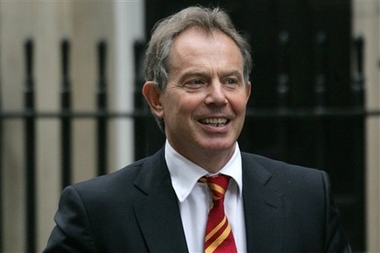Newsmaker
Once a star, Blair departs battered
(Reuters)
Updated: 2007-05-10 16:32
 |
Large Medium Small |
LONDON - A decade ago, Britain's youngest prime minister in nearly 200 years soared into office like a rock star, riding a wave of euphoria that swept the land.
 British Prime Minister Tony Blair arrives back at 10 Downing Street after Prime Minister's Questions at the House of Common, London, Wednesday, May 9, 2007. [AP]  |
| |||
Back then, the right-wing Sun tabloid - which had in the past backed Blair's conservative rivals - gushed that he "fired the country's imagination. He has captured its mood for a fresh start and sparked a revolution of rising expectations".
He had young kids. His bus blasted the pop anthem "Things Can Only Get Better". He had once played guitar in a rock band.
He had ditched the class warfare roots of one of Europe's hoariest socialist parties and abolished a clause in its charter calling for "common ownership of the means of production".
Within months of taking office, he was working his media magic, uniting the country after the strangely traumatising death of Princess Diana. He called her "the people's princess," and delivered the line with note-perfect sincerity.
Spin doctors and "special advisers", many fresh from media careers, moved into the government ministries, shoving aside professional civil servants in policy rooms.
In parliament, Blair crushed successive Conservative Party leaders with a preternatural skill in debate. He told his party his skills had won them power, and demanded loyalty in return.
DOMESTIC AGENDA IN THE SHADOW OF IRAQ
Blair came to office with an ambitious agenda for domestic policy, shared with his party rival, finance minister and presumed successor Gordon Brown. They increased spending on public services such as health and education, while fighting their party's labour union allies to impose reforms.
Blair and Brown allowed the Bank of England to set interest rates independently, winning confidence in financial markets.
Britain enjoyed its longest economic expansion since it created industrial capitalism two centuries ago. House prices quadrupled. Unemployment fell. Hospital waiting lists shrank, child poverty dropped and school exam results improved.
The capital especially thrived. Newsweek named London the coolest city in the world. The International Olympic Committee awarded it the 2012 games. Michelin handed out stars to its restaurants. Madonna moved there. So did Roman Abramovich.
But when historians teach about Blair, his domestic agenda will lie in the shade of foreign affairs. Above all, he will be judged on his decision to back US President George W. Bush in the invasion of Iraq.
Blair entered office after the West had failed to stop bloodshed in the Balkans and Rwanda, and he brought a firm conviction that Britain must act forcefully on the world stage.
He proved his statesmanship early, with the 1998 Good Friday agreement that ended 30 years of conflict in Northern Ireland, a deal finally cemented this week with a power-sharing government.
In 1999 he and his friend Bill Clinton led NATO into an air war that drove Serbian forces out of Kosovo. Blair then sent Royal Marines to bail out a UN mission in Sierra Leone.
After the September 11, 2001 attacks on the United States, Blair declared that he stood "shoulder to shoulder" with America, and hitched his future to its new leader, Bush.
But the right-wing Bush was widely loathed in Britain. Cartoonists drew Blair as Bush's "poodle".
When it became clear that Blair intended to join Bush in war in Iraq, hundreds of thousands of Britons marched in protest. European allies France and Germany were vigorously opposed. Cabinet member Robin Cook resigned with an impassioned speech.
But a defiant Blair sent 45,000 troops, Britain's biggest deployment in 50 years. He justified the war by saying Iraq had illegal weapons. But they turned out not to exist.
One of the darkest hours of Blair's premiership came with the quiet suicide of a government scientist, David Kelly, who slit his wrist after being named as the source for a news report that claimed the government hyped intelligence to sell the war.
The next day, a reporter challenged Blair at a briefing in China: "Have you got blood on your hands and will you resign?"
Yet Blair still managed to win a third term in 2005, and has not shrunk from war. Last year he sent thousands more troops to Afghanistan, where fighting has been fierce.
In July last year, Islamist suicide bombers struck London, killing 52 commuters. They said they were responding to Blair's foreign policy. Blair said the strikes proved he was right to maintain a tough stance on terrorism at home and abroad.
During his final year, Blair's government was dogged by scandals. Police were called in to probe Labour Party funding.
Meanwhile, his Conservative opponents are energised by a youthful new leader, David Cameron. No coincidence: Cameron resembles nothing so much as a young Tony Blair.
| 分享按钮 |
